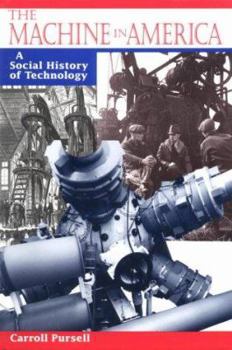The Machine in America: A Social History of Technology
Select Format
Select Condition 
Book Overview
2008 Outstanding Academic Title, Choice MagazineFrom the medieval farm implements used by the first colonists to the invisible links of the Internet, the history of technology in America is a history... This description may be from another edition of this product.
Format:Paperback
Language:English
ISBN:0801848180
ISBN13:9780801848186
Release Date:March 1995
Publisher:Johns Hopkins University Press
Length:376 Pages
Weight:1.25 lbs.
Dimensions:1.0" x 6.0" x 9.0"
Customer Reviews
1 rating
Pretexts, Motives and The Valid Human Life
Published by Thriftbooks.com User , 21 years ago
Pursell's acknowledged primary debt to Leo (The Machine in the Garden) Marx says a lot about his perspective in this nicely paced, often fascinating work of U.S. social history. Perhaps the best way to encapsulate the book is cite Pursell's citation of two quotes: one at the beginning of the book, the other at the end. In the beginning, Pursell cites another historian (whose name escapes me) who noted the period of European Discovery could be explained in terms of this dynamic of exploration: "the pretext was religion, the motive was gold." From this Pursell's view of technology can be extrapolated as well: the pretext is efficiency, but the motive is hegemony. At the end of the work, he cites Lewis Mumford, who in a review of Nader's "Unsafe at Any Speed," wrote that people had become too accepting of the abstractions that are used to justify the unblinking acceptance of technology, e.g., money, power, etc. Mumford suggested that until some consensus could be reached about "what constitutes a valid human life," that humanity would continue to be subject to the intended and unintended consequences of technology and the technocracy that creates it. (Incidentally, unintended consequences are often called externalities in business school, a word that neatly sets these depradations outside of the corporation in the same way they are channeled outside the corporation in the form of pollution, unemployment, and other forms of socially irresponsbile behavior.) In between Pursell discusses the rise of the technocratic class from the imposition of Taylorism to regime of Fordism and into the postmodern age of production. It is a big subject, and Pursell, admittedly, has to carefully choose his examples to quickly advance his fairly familiar thesis; that from a nation where technology was early on fairly democratically distributed, technologies were introduced which placed technology and therefore power into the hands of fewer and fewer people. Not just material technology, of course, but the technology of the scientific approach. Pursell does a particularly good job on the rise of the technocratic class of civil engineers around the time of the Civil War through the present, men such as Herbert Hoover, who, for their clients built mines, canals, dams, roads, bridges, railroads all over the world. In so doing, they spread the gospel of science as embodied in the instrumental uses of capital. In addition they also managed to pocket a good deal of gold. Pursell suggests that these technological imperialists were backed up and supported by the U.S. government from fairly early on, and, that they continue to be, now as then, helped most forcefully through the generous funding of the military industrial complex Pursell also covers the reaction against the technological elite in the 60s and 70s -- the era when "Silent Spring," "Small Is Beautiful," and other influential works began to question the so-called "success" of the modern technological world.






